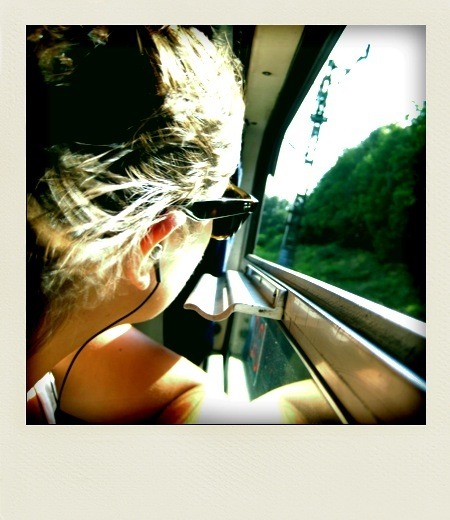Train of Thought

Window down, face forward. On the rail in Hungary last summer.
I’ve taken the train to visit Pop Pop dozens and dozens of times, so I have my routine down pat. I get to Penn Station 30 minutes early, buy a bagel at my shop, print my Amtrak pass, and then when it’s time to board, I find a spot on my side of the train and pretend to sleep until departure time. Secures me a double seat every time! The extra room is key for the 7-hour ride in front of me, though I’ll admit, I have met some lovely fellow passengers when the train is too full for my trickery.
But this weekend, as I was traveling back to the city, I realized something. For as many times as I’ve taken that same train and done that same routine, I realized I cannot, for the life of me, tell you the stops. If you offered to pay me one million dollars to name the stations between New York Penn and Altoona, I couldn’t do it. I might get some — Trenton, Elizabethtown, Lancaster, 30th Street in Philly, Tyrone — but definitely not all. And absolutely not in order.
Now my aunt? My aunt could tell you. My sister? She could, too. And my dad? Oh, my dad could tell you alright, and he’d be able to recall the timetable, too, down to the minute. The last time he stayed at my apartment in Brooklyn, he counted the number of stairs from the base of my stoop to my doorstep on the third floor. I’d tell you how many he counted, but I forgot. Typical.
Details are just not important to me. Unless they’re attached to a certain feeling or a special memory, they’re nothing. It’s the way my brain is wired, I guess. When I’m on the train, I’d rather look at the silos, the parked cars, the empty ball fields. I’d rather notice the black birds resting atop the power lines — will the whish of the train set them flying? I’d rather see the service roads, the sycamores, the satellite dishes mounted on rooftops — who lives there? Who loves there? I listen to the wheels gliding along the track, slowing down and speeding up, steady. There are American flags flying in a country that I sometimes forget exists when I’m here in the bubble that is, supposedly, one of the brightest, most culturally-rich hubs in the world. What do we know, we city people, about living in this country? What do we know about our culture? We pride ourselves on being aware and being open-minded, but our world is so insular, so secluded, so foreign to the peaceful land I see rushing past my window. Manhattan is an island. We millions of people are together, but we are very, very much alone. Detached.
These are the things I think about; not the station stops ahead or behind. It’s more about my heart than my head. My ride is marked by feeling. By the time I’ve gotten where I’m going, I feel calm, centered. It’s almost like I’ve been at yoga or synagogue, or on a long run.
My trips to see Dibi and Pop Pop are marked by feeling, too. It’s not about what we do, what we eat for dinner or what movies we watch, though I remember those details when moments are made from them, like the time we clapped along to Fiddler on the Roof together. (“Drink l'chaim, to life!”) But my aunt always seems to fixate on how, exactly, we will spend our time. She worries about what I’ll make Pop Pop for dinner while she’s at work. (I don’t know, whatever is in the fridge?) She asks what time I think I’ll take my shower in the morning. (I don’t know, do I have anywhere to go, really?) She wants a complete report on our visit to see Dibi at the nursing home — How much did she eat? Did she fall asleep? Do her nails look decent? It’s good that she cares enough to ask, especially about Dibi, but are the answers important? I’ll make dinner. I’ll find a time to shower. Dibi’s day today will be pretty much exactly like Dibi’s yesterday and tomorrow. It’s sad, but it’s Alzheimer’s.
What’s important to me — and I think to Pop Pop, too — is the feeling we get by being together. It’s seeing Dibi’s eyebrows perk up when we make a joke that resonates to the Ruthie we know is in there, somewhere. It’s sitting in the dining room with Pop Pop long after our food is all gone, and holding hands across the table, laughing or crying or both, depending on the hour. It’s looking around the room, our grandfather-granddaughter world, and not seeing the stops, the to-do list, in front of us that visit, but rather, pausing to feel the bond that links us. Who cares what’s for dinner or what station is next on the line? Why can’t we just be? Just love our time together.
Pop Pop and I, we’ll leave it to the others to worry about the details. We’ll enjoy the day for what it is — a quiet, beautiful ride.